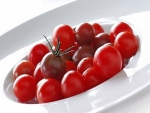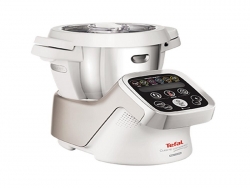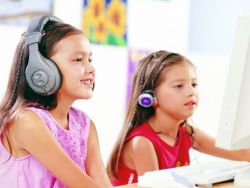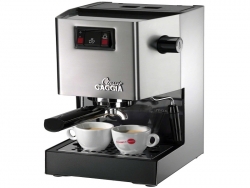Us ready - 10 Tips for Parents
Parents control the supply lines. You decide which foods to buy and when to serve them. Though kids will pester their parents for less nutritious foods, adults should be in charge when deciding which foods are regularly stocked in the house. Kids won't go hungry. They'll eat what's available in the cupboard and fridge at home. If their favorite snack isn't all that nutritious, you can still buy it once in a while so they don't feel deprived.
From the foods you offer, kids get to choose what they will eat or whether to eat at all. Kids need to have some say in the matter. Schedule regular meal and snack times. From the selections you offer, let them choose what to eat and how much of it they want. This may seem like a little too much freedom. But if you follow step 1, your kids will be choosing only from the foods you buy and serve.
Quit the "clean-plate club." Let kids stop eating when they feel they've had enough. Lots of parents grew up under the clean-plate rule, but that approach doesn't help kids listen to their own bodies when they feel full. When kids notice and respond to feelings of fullness, they're less likely to overeat.
Start them young. Food preferences are developed early in life, so offer variety. Likes and dislikes begin forming even when kids are babies. You may need to serve a new food a few different times for a child to accept it. Don't force a child to eat, but offer a few bites. With older kids, ask them to try one bite.
Rewrite the kids' menu. Who says kids only want to eat hot dogs, pizza, burgers, and macaroni and cheese? When eating out, let your kids try new foods and they might surprise you with their willingness to experiment. You can start by letting them try a little of whatever you ordered or ordering an appetizer for them to try.

Drink calories count. Soda and other sweetened drinks add extra calories and get in the way of good nutrition. Water and milk are the best drinks for kids. Juice is fine when it's 100%, but kids don't need much of it — 4 to 6 ounces a day is enough for preschoolers.
Put sweets in their place. Occasional sweets are fine, but don't turn dessert into the main reason for eating dinner. When dessert is the prize for eating dinner, kids naturally place more value on the cupcake than the broccoli. Try to stay neutral about foods.
Food is not love. Find better ways to say "I love you." When foods are used to reward kids and show affection, they may start using food to cope with stress or other emotions. Offer hugs, praise, and attention instead of food treats.
Kids do as you do. Be a role model and eat healthy yourself. When trying to teach good eating habits, try to set the best example possible. Choose nutritious snacks, eat at the table, and don't skip meals.
Limit TV and computer time. When you do, you'll avoid mindless snacking and encourage activity. Research has shown that kids who cut down on TV-watching also reduced their percentage of body fat. When TV and computer time are limited, they'll find more active things to do. And limiting "screen time" means you'll have more time to be active together.
Eating tips for primary school children
Us ready - Breakfast is important
It is important to encourage breakfast. A good night’s sleep followed by food in the morning helps your child to stay active and concentrate at school. It also means your child is less likely to be too hungry during the morning and it can help with performance at school. Be a role model and let your child see you eat breakfast too. A bowl of cereal with milk and fresh or stewed fruit is a great starter for the whole family.
School lunches
Many schools have a canteen that offers a range of food choices. Most schools follow government guidelines to encourage healthy food choices. The food your child chooses might be high in cost and energy, but low in nutrients sometimes. An alternative is a packed lunch from home, which is a great way for your child to learn about healthy food and to help with preparation.
Lunch box suggestions include:
- Sandwiches or pita bread with cheese, lean meat, hummus and salad
- Cheese slices, crackers with spread, and fresh or dried fruits
- Washed and cut up raw vegetables or fresh fruits
- Frozen water bottle or tetra pack of milk, particularly in hot weather.
School lunches – foods to limit
Highly processed, sugary, fatty and salty foods should only make up a very small part of your child’s diet. Foods to limit in everyday school lunches include:
Processed meats such as salami, ham, pressed chicken and Strasbourg
Chips, sweet biscuits, and muesli bars and breakfast bars
Fruit bars and fruit straps
Cordials, juices and soft drinks.
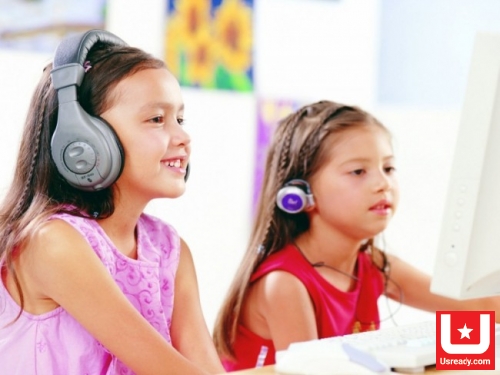
Treats and peer pressure
Peer pressure to eat particular ‘trendy’ foods at this age is strong. Let your child eat these kinds of foods occasionally, such as at parties, special events or when the rest of the family enjoys them. It’s best to limit the amount of money children are given to spend at school or on the way home.
The occasional lolly, bag of chips or takeaway food doesn’t do any harm. If they are eaten too often, however, you might find that:
- Not enough nourishing foods are eaten.
- Children become overweight or obese.
- You’re spending a lot of money – it’s much cheaper to provide homemade snacks and lunches.
- You’re missing a chance to teach your child about healthy eating.
After-school snacks
Children of this age may have swings in appetite depending on activity levels, so allow them to choose how much they need to eat while offering a wide variety of healthy foods. Some children only eat small amounts at the evening meal, so make sure that the afternoon snack is nutritious, not just high in energy.
Snack suggestions include:
- A sandwich with a glass of milk
- Cereal and fruit
- A bowl of soup and toast.
Family mealtimes
For schoolchildren, family mealtimes are a chance to share and talk about the day’s activities and events. The evening meal together is an important time to do this.
Family mealtime suggestions include:
- Allow talk and sharing of daytime activities.
- Avoid distractions such as the television, radio or the telephone.
- Let your child decide when they are full – don’t argue about food.
- Allow children to help with preparing meals and shopping.
- Teach some simple nutrition facts such as ‘milk keeps your bones strong’.
Drinks
Suggestions include:
- Children should be encouraged to drink plain water.
- Sweet drinks such as cordials or fruit juice are not needed for a healthy diet and aren’t recommended.
- A glass of milk (or a tub of yogurt or slice of cheese) equals a serve of dairy food. Three serves are needed each day for calcium.
Exercise and activity
Physical activity is an important part of good health. Try to encourage your child to do something active each day, such as a hobby, play a game or be involved in sport. Some parents may also worry about their child’s weight.
For primary school children 60 minutes of activity is recommended each day, and no more than two hours of watching TV, DVDs or computer games.
To increase your child’s activity, try to:
- Limit the amount of time spent watching television for the whole family.
- Do something physical and active together.
- Go and watch your child play sports.
- Encourage daily activity, not just exercise.
- Use the car less – that means everyone!
Healthy tips for school-aged children
Suggestions include:
- Children need a variety of different foods each day.
- Snacks are an important part of a healthy diet for active children.
- Make snacks nutritious, not just high in energy.
- Plan to share meals as a family.
- Enjoy talking and sharing the day’s happenings at mealtimes.
- Let children tell you when they’re full.
- Give your child lunch to take from home.
- Let children help with food preparation and meal planning.
- Encourage physical activities for the whole family.
- Encourage children to drink plain water.
Things to remember
Snacks are an important part of a healthy diet for active children, so offer nutritious as well as high energy snacks.
Let children help with food preparation and meal planning.
It is important to encourage breakfast, because a good night’s sleep followed by food in the morning helps your child stay active and concentrate at school.
Limit screen time and aim for some physical activity every day.
Posted by Bich Van Tags: Breakfast, children, computer, drink, Exercise, Family mealtimes, food, healthy, limit TV, School lunches, snacks, Tips for Parents, US READY


